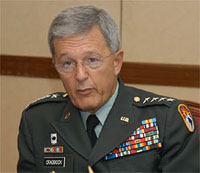More choppers and unmanned planes needed in Afghanistan
More helicopters, surveillance aircraft and unmanned aerial vehicles are needed in Afghanistan to support the armed forces there, a senior NATO official said Wednesday.

U.S. Gen. John Craddock, NATO's Supreme Allied Commander of Europe, also said he wants national authorities to reduce or drop restrictions on how and where troops from their countries can be used in the alliance's Afghanistan mission.
"We need more full-motion video - and that's generally unmanned aerial vehicles - we need more surveillance aircraft ... we need helicopters, medium- and heavy-lift helicopters," Craddock told reporters at an annual security conference at the Vienna-based Organization for Security and Cooperation in Europe.
Despite the request for more equipment, Craddock said the key to success in the war-ravaged country is not winning by military means but focusing on development and governance.
Craddock declined to provide specific equipment figures, but said "substantial numbers" of helicopters were needed. He said some have been leased commercially to fill the gap but added "that is not something we want to do" when participating nations have the capacity.
He said he would also welcome more troops in Afghanistan, but stressed he was more focused on capabilities than numbers.
"An infantry battalion in Afghanistan without tactical mobility, without intelligence support, surveillance capability, reconnaissance, is very limited," he said.
Restrictions placed upon forces by national governments constrained the flexibility of commanders and should be lifted, Craddock said.
"Too often the forces there now are relatively fixed because we don't have adequate tactical mobility to move them around to be able to do the jobs we need for them to do," he said.
In June, militants killed more U.S. and NATO troops in Afghanistan than in Iraq for the second straight month. At least 45 international troops died in Afghanistan in June, the deadliest month since the 2001 U.S.-led invasion to oust the Taliban.
When asked about the deaths, Craddock cited several factors: the end of the poppy harvest, which freed up young men to fight for the Taliban; the greater opportunities for attacks since NATO forces have been patrolling new areas and the easing of border controls between Pakistan and Afghanistan.
"We think it's essential that the Pakistani government and military regain control of that border area and continue their efforts to coordinate" intelligence with NATO and U.S. forces, Craddock said.
In a separate speech to the OSCE, Craddock said the national Afghan police force continues to lag significantly behind the Afghan national army, a situation that must be resolved.
"Corruption, criminality and a lack of qualified leadership continue to plague this key function," he said.
Subscribe to Pravda.Ru Telegram channel, Facebook, RSS!


